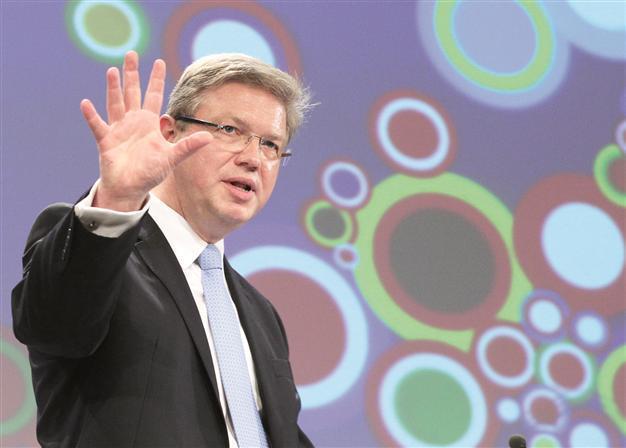EU urges opening of chapter on rights, justice
ANKARA - Hürriyet Daily News

European Commissioner for Enlargement and European Neighborhood Policy Stefan Füle addresses the media at the European Commission headquarters. AP Photo
The European Commission, in its enlargement strategy paper for 2013-2014, called on Turkey to respect fundamental rights in practice, while its progress report allocated considerable space for deficiencies in the areas of the judiciary and fundamental rights.
The commission expressed its will to open the relevant chapter; 23: Judiciary and Fundamental Rights and 24: Justice, Freedom and Security as soon as possible,” so as to enhance the EU’s dialogue with Turkey in those areas where the Union called “for progress and full implementation of reforms.”
In its “Enlargement Strategy 2013-2014,” the European Commission emphasized the rule of law is, “now at the heart of the enlargement process,” and called on all countries of the Western Balkans and Turkey, “for the need to undertake further reforms to ensure the principles of freedom of expression and the protection of the rights of persons belonging to minorities.”
In its strategy paper, the commission welcomed the Turkish government’s reforms including the fourth judicial reform package and peace process, which aimed to end terrorism in the country, the democratization package and the conciliation committee of the parliament, which was set up to draft a new constitution.
Yet, in the strategy paper, the commission also called on the Turkish government to further respect fundamental rights in practice.
The paper said the “excessive use of force by police and the overall absence of dialogue” during the Gezi protests had raised serious concerns.
“This underlines the urgent need for further reforms and the promotion of dialogue across the political spectrum and in society more broadly, as well as for respect of fundamental rights in practice…,” said the strategic paper.
“Further changes are needed in the Turkish legal system, especially to strengthen freedom of expression and of the media and freedom of assembly and of association; judicial practice should systematically reflect European standards,” the paper said. The commission called on the Turkish government for full implementation of the fourth judicial reform package.
The commission said all of these developments underlined the importance of EU engagement and of the EU remaining the benchmark for reform in Turkey.
Meanwhile, in the annual progress report, the commission listed relevant deficiencies in reforms and in implementation under the chapter 23: Judiciary and Fundamental Rights.
As regards freedom of expression, the reports welcomed the fourth judicial package but added, however, “Implementation of these legal changes in line with European standards should lead to a significant improvement in the level of respect for freedom of expression in Turkey.”
With regard to the efficiency of the judiciary, the report said that concerns about legislation and judicial practice in the criminal justice system remained, which also applied to high-profile cases such as KCK and Ergenekon.
“The capacity of prosecutors to lead investigations and filter evidence obtained by police, limited access by the defense to prosecution files, poor implementation of cross-examination at trial, and the poor quality or lack of reasoning in the indictments have been criticized as impediments to effective defense,” said the report.
Mentioning progress in terms of the opening-up of space for free debate on topics perceived as sensitive, such as the Kurdish and Armenian issues, the report cited that dozens of mostly left-wing or Kurdish journalists were still detained.
“Statements of state officials had a chilling effect and instigated investigations by public prosecutors. Moreover, state officials themselves continued to launch suits against critical journalists and writers,” said the report, citing the problematic media ownership structure.
The mainstream media hardly reported on the Gezi Park protests and columnists and journalists were fired or forced to resign after criticizing the government, the report said, adding, “As a result, freedom of the media remained restricted in practice.”
The report addressed the need for reforms to ensure respect for freedom of assembly in line with European standards, giving examples of disproportionate use of force by the police against demonstrators in rallies in connection with the Gezi Park protests, students’ rights, the environment, the activities of the Higher Education Board (YÖK) and trade union rights.
The report mentioned warnings and fines by the Supreme Board of Radio and Television (RTÜK), and cited high-level officials who criticized the social media as a threat to society. A number of citizens were taken into police custody for posting Twitter messages about the Gezi Park protests, said the commission.
Regarding freedom of association, the report referred to the Confederations of trade unions KESK and DISK and associated trade unions facing investigations in relation to terrorism charges.
Many trade union representatives were arrested, the report said, adding that some trade unionists on trial in the KCK cases were released pending trial following the launch of the peace process.
